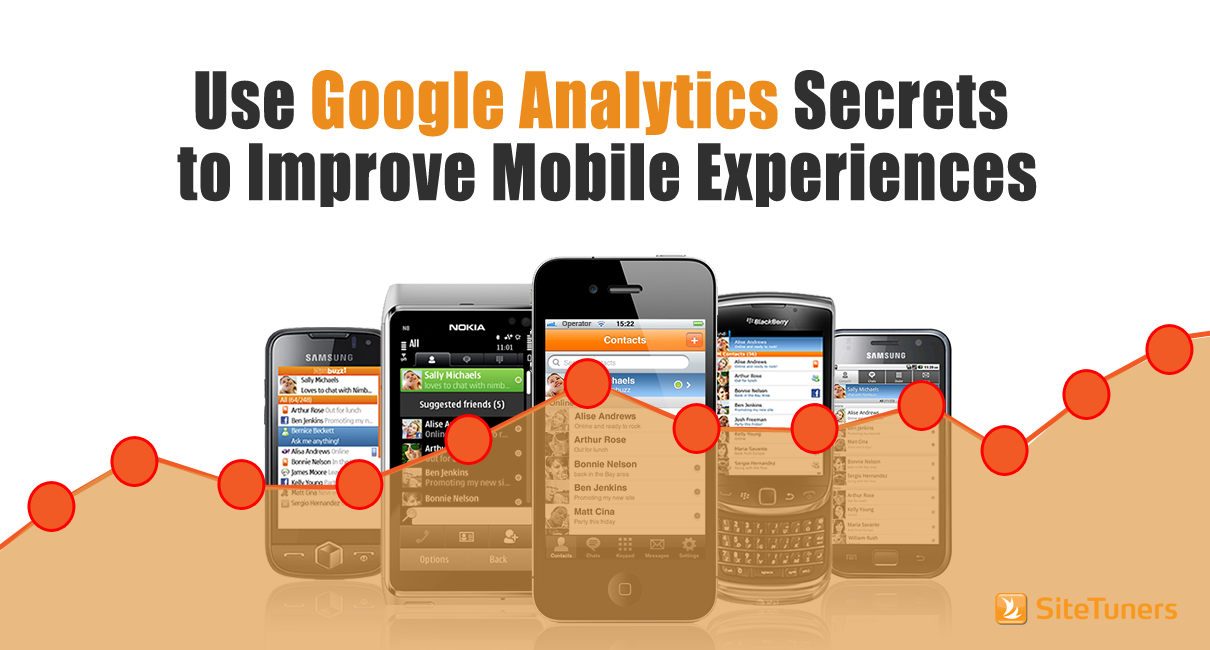Summary – The meteoric rise of the number of people who use their smartphones as a daily essential compels digital marketers to optimize for mobile traffic. According to Statista, almost 57% of web page views now happen on mobile devices. This means mobile is no longer optional for businesses, but a must for success.
So the only question that remains is which platform to utilize: a mobile app or a mobile website?
In this article, we will further tackle the edge of both platforms, how you can maximize it for conversion, and what your users expect from your mobile marketing strategies.
Understanding Mobile Usage and Behavior as Marketers
People don’t just carry their phones everywhere. They check it often and even feel lost if they’re unable to access it. Mobile phones are used on such a personal and intimate level by users, to say that people have a relationship with their phones is an understatement.
For many users, the mobile phone isn’t just a device. It connects them to their virtual world, where they can hang out with their friends, discover new things or places to shop, or even find love.
Interestingly, the Pew Internet Research Center found that younger people are more comfortable doing their online activities using mobile phones with most of them admitting to be online “on a near-constant basis.” Meanwhile, older people still favor desktops.
Clearly, mobile serves different needs for different audiences. Understanding these needs is a good starting point to understand the varying motivations and behaviors of mobile users.
What are the Main Users’ Intent on Mobile Usage?
- Killing Time
People browsing through their mobile phones to kill time is more common than you think. Whether they’re lounging at home or in public places, people turn to their phones when they’re bored, nervous, fidgety, or simply have some spare time. When they’re on kill time mode, people are usually not in the mood to take any conversion action while browsing.
- As Primary Device for Browsing
The younger generation is more inclined to use their phones not just for casual browsing, but also for specific needs. This means their motivation for conversion using their smartphones or tablets is already present.
- As Secondary Device for Browsing
Meanwhile, some people still find it convenient to shop using their laptops or desktops. They might use their mobile devices to browse, but will switch to carry out their purchases. In this case, users are in research mode to look for the best options out there.
- Only for Urgent Needs
This type of users might not be very comfortable to use their mobile phones for a solution to their problems. However, urgent situations such as traveling and hurried purchases motivate them to do so. The user intent is usually limited to accessing information.
What Does Higher Mobile Traffic Mean for Marketers?
The growth of mobile internet users creates a massive opportunity for digital marketers. With people using their mobiles constantly, businesses have a better chance of reaching them in their digital marketing efforts. Below are just some of the benefits of increased mobile traffic:
1. Social Media Marketing Becomes Easier
A Statista dossier reveals a telling data on mobile behavior and social media: 61 percent of users in North America used their mobile devices for social media access. Social media is still expanding, with users not only increasing in numbers but also spending more time within social platforms.
With the heavy social media use among mobile users comes ample room for digital marketers to find and engage their audience at different stages in their buying journey. And with most users’ social media activity not being limited to a single platform, marketers are presented with different, unique opportunities to drive clicks and mobile traffic back to their websites.
2. Marketers can Reach Users Easily
According to eMarketer, smartphone users in the US spent an average of 3 hours, 10 minutes daily on their devices in 2019. The World Economic Forum reports that the time spent on mobile devices increased to 4 hours and 12 minutes in 2021. This means that mobile phone usage is still on the rise, and is the primary device that people use to consume online content.
This is a boon for digital marketers. If people spent half of their waking hours using smartphones, that means they’re in the habit of checking their phones at frequent intervals throughout the day. Which translates to a higher likelihood of them seeing your digital campaigns and promotions. So if you do your promotional emails or posts right, it’s highly likely that people will notice. This gives you a better chance of increasing the volume of your site’s mobile traffic.
3. Higher Google Rankings
In response to the rapid increase in mobile device users, Google moved to mobile-first indexing in July 2019. This means that Google now prioritizes the mobile version of your website’s content when indexing and ranking for search results. Before this, Google used the desktop version to rank websites for search relevance.
With Google’s shift towards mobile-first, businesses can no longer afford to neglect their mobile presence. Having an optimized mobile website is now key to boosting your visibility in Google search. Optimization in this sense doesn’t just refer to optimizing for search engines, but ensuring a great mobile experience for your online users.
Best Uses of a Mobile App and a Mobile Website
The key to optimizing for mobile traffic is understanding user behavior and intent. There are still differences in conversion rates between desktop and mobile device types. But it is also apparent that people are using smartphones especially in the research phase of their buying journey.
When developing or optimizing a site for mobile devices, you have to consider what needs your site should specifically address to satisfy user intent and purpose. Should you opt for an app or just a responsive mobile site? Here, it’s clear that there will be no one-size-fits-all answer to this question.
Mobile websites are simply extensions of desktop versions. They just have an adaptable version for mobile traffic that has a responsive design for any mobile browser. Apps, on the other hand, need to be developed separately and users need to download them from the Google Playstore, iOS App Store, etc., depending on the device’s operating system.
Many people believe an app is the answer to all their mobile requirements and the app is perceived as the ultimate solution to conversion woes. According to eMarketer, mobile users spend a whopping 90% of smartphone use inside apps. However, the distinction between mobile sites and apps is also blurring as more and more mobile websites are now designed to behave like apps.
The reality is that there is no perfect solution. You need to evaluate what works best for the business. Below we examine the advantages of both the mobile website and app to help you decide which platform is more ideal for your website:
Advantages of a Mobile Website
1. Mobile Websites Don’t Need Different Customization per Operating System
Compared to apps, mobile websites have fairly low customization requirements. You don’t need to develop different versions for Androids, iPhones and other mobile systems. A well-developed mobile site is compatible across all platforms.
2. Mobile Websites are Indexed and can be Easily Found in Search Results
You have a better chance of being found in search engines compared to having an app. So if you’re not as well-known as Amazon, Netflix, or your brand is not prominent in your industry, a mobile website is a must so people can easily find you in search results.
3. Mobile Sites are Instantly Available and Don’t Need Frequent Updates/ Upgrades
A mobile site is the best choice if you want to skip the need to download. Unlike with an app, visitors can skip downloading it and just simply open it in their browser. The zero wait time is always convenient. Users don’t have to worry about updates as well. They can access their needed information the moment they click on your website.
4. They have a Wider Reach
Not every mobile user will be keen to install your app, but all of them have a browser on their devices. A mobile website is easier to access so your potential reach and the opportunity for incoming mobile traffic is bigger as well.
5. Mobile Websites are Less Expensive than Apps
If you have budget constraints, app development and support may be too expensive. You can maximize your limited budget with a mobile website instead.
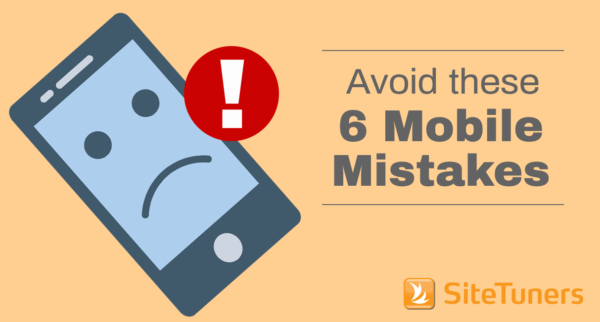
Design a better mobile experience for your visitors
Advantages of Mobile Apps
1. High Level of Customization
You can personalize an app for distinct content and experiences that are relevant to your users. Customization enhances the app’s usability and as a marketer, you can benefit from carrying out specific marketing strategies for each user.
2. Take Advantage of Notifications
You can send two types of notifications through an app: push notifications and in-app notifications.
- Push Notifications
Notifications that appear on the home screen of users are great for reminding them about your brand. From an ending sale to event reminders, and personalized messages, allowing users to activate Push Notifications is a wise marketing move. You should also allow them to turn them off at any time. The great news is that statistically, users allow push notifications upon downloading.
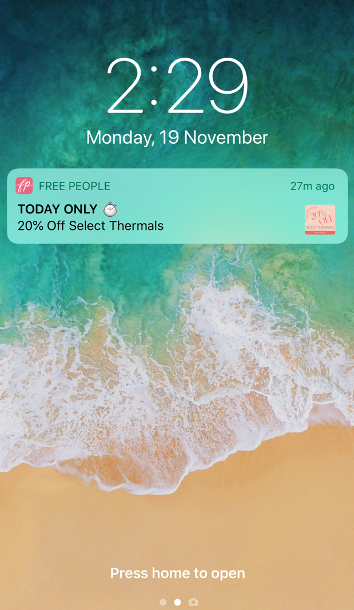
Just be careful not to overdo it and flood them with irrelevant information. If their phone beeps every few minutes, they are more likely to turn off the notifications or even uninstall the app.
- In-App Notifications
In-app notifications appear when users open the app itself or while they’re using it.
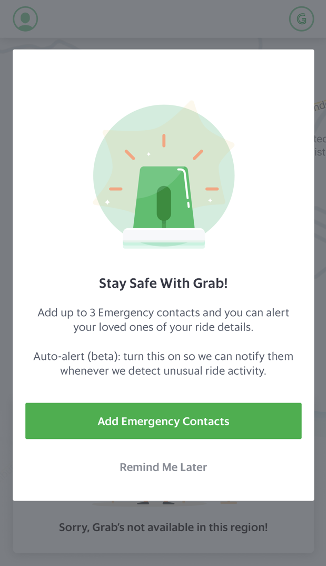
These are useful if you want to increase user engagement with your brand through certain content. It’s also helpful if you want to introduce them to new features and updates about the app.
3. Regular Use
An app works well if your business requires repeated transactions. The app is a separate entity existing on a user’s mobile device. This eliminates competition to some extent. For example, if a user trusts a brand enough to download their app, chances are they would use the app every time they want to make a purchase and not bother with the search-browse-compare-buy cycle.
4. Interactive Use
In cases where a lot of interaction between a user and the website is required, an app makes more sense. Think dating, gaming and social media websites. It is much more convenient for a user to have an app on their mobile device where they can save their preferences, their gaming scores, their social media activities, etc.
5. Offline Access to Some Content
An app can make certain content available to users even when they are offline. For instance, an e-commerce app would allow users to see information about their past orders or specific content that was saved for later viewing.
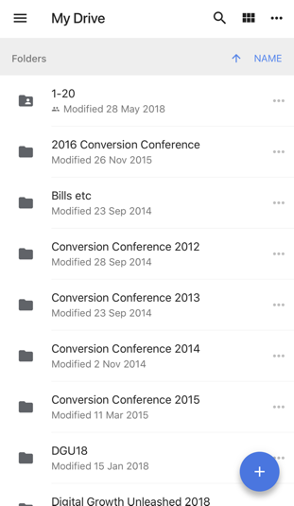
This is also how music, messaging, and file storing apps allow you to access saved files even when offline.
6. No Need to Log-in Every Time
Upon registering in an app, the user won’t have to re-enter their login credentials repeatedly. However, apps with sensitive data like banking apps should enable enhanced security features like multi-factor authentication.
7. In-app Purchases
You can boost your sales by offering in-app purchases in exchange for exclusive features or content that are not available in a free version. For example, gaming apps offer users to buy extra lives to advance in a game.
Issues to Watch Out for with Mobile Apps
Now you have an idea of the benefits that mobile apps bring to the table for your business. But like any platform, you also have to be aware of the downsides and take these into consideration:
- Users have Low Tolerance for App Issues
Let’s face it. Users expect apps to work faster and give them more value than a mobile website. In fact, a Packetzoom study showed that more than half of users will uninstall or delete an app that takes too long to load. This does not bode well for your conversions.
App issues like latency and persistent crashes can also negatively affect your app’s ability to rank high in app store search results, which are based on app performance and usage metrics.
- Ratings and Reviews Make or Break It
Your app’s ratings and reviews on the app marketplace affect users’ perception of its dependability and their eagerness to download it. Reviews are also one of the criteria used by the search ranking algorithm on both the Apple App Store and Android Play Store.
Apps with a good number of reviews are ranked higher in search, which means users can easily discover, find and download it. This puts newer apps with little to no reviews at a significant disadvantage. In order to improve your app’s discoverability, you’d need to provide some marketing push so your potential customers can find it and be convinced to use it. At the same time, you have to be willing to devote resources to ensure that the app constantly meets user expectations.
- App Development and Maintenance is Expensive
As noted earlier, users have higher performance expectations from apps. Your app needs to be constantly updated to improve and maintain its performance. Be ready to have a team of developers remove bugs and fix usability issues. This means you need to have a budget earmarked for app development and maintenance. Remember: NO app is better than a bad app.
How to Optimize a Website for Mobile Traffic Effectively
1. Shorten Your Content
Text looks excruciatingly long on a smaller screen compared to a desktop. Make sure that you get your point across with a shorter version for mobiles. Include only content that’s necessary. This could mean removing fluff from your copy and even images that don’t add value to your mobile website or app content. Consider the fact that users usually just scan with the flick of their thumbs.
2. Break Your Content Into Smaller Chunks
Adapt to the users’ scanning behavior by breaking up your content into more easy-to-digest information. For instance, sections and concise subheadings hugely help in letting the readers know what the main points are.
3. Use Images to Convey Your Message
Mobile users rely on visual cues. Use relevant images so users will be guided on which parts are relevant to them. For instance, images work well for navigation on mobile screens since users tend to click on them.
4. Be Aware of the Layout
How are the text and images situated? Pay attention to the overall layout and design of your site. Things that appear fine on a larger desktop screen might appear disjointed or crowded on a mobile screen.
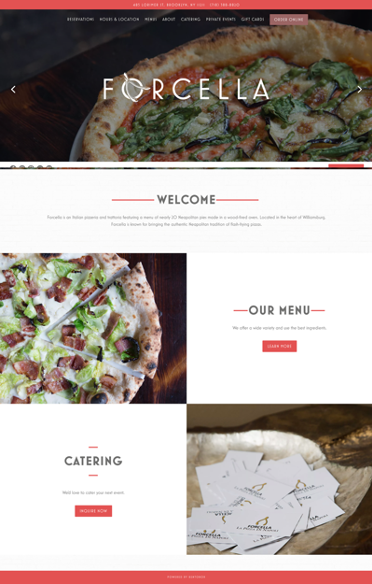

Look at how Forcella tweaked the placement of its website elements once it’s on their mobile version. The CTA button should be clear and visible above the bottom of the home screen.
5. Optimize Images for the Small Screen
While using images has its advantages, pictures that take too long to load are a big no-no. Heavy images are especially problematic for mobile traffic since the load time on 4g is usually slower compared to Wi-fi. Optimize images that look good and are easy to see. Compress the images to save more space and improve the loading time.
6. Display Contact Details
If you can handle an increased call volume, it’s ideal to place your telephone number at the top of your webpage as a trust symbol. Implement click-to-call so the number instantly redirects to an actual call to your company. This may be a small detail, but a good website experience will make all the difference from your competitors.

7. Use Videos
Videos work well in mobile marketing since people would rather watch videos than reading on their mobile devices. By using videos, you can help customers understand what your business is about in just a few minutes.
One thing, though, is that your videos shouldn’t automatically play on your website. Let users have control over the experience by letting them decide whether they want to play the video or not.
8. Mobile Searches
Be aware that desktop and mobile searches are different. Mobile users have the option to activate location services on their devices, so when they search for something they also get location-specific results.
9. Be Mindful of Button Sizes
Touchscreen mobile devices are notorious for causing the “fat finger syndrome” where users inadvertently trigger an unintended action on your website. It’s important to design your mobile website with this in mind.
Remember that mobile users navigate your site using their fingers. Make sure that the buttons are big enough to find and click so you don’t confuse and frustrate your users.
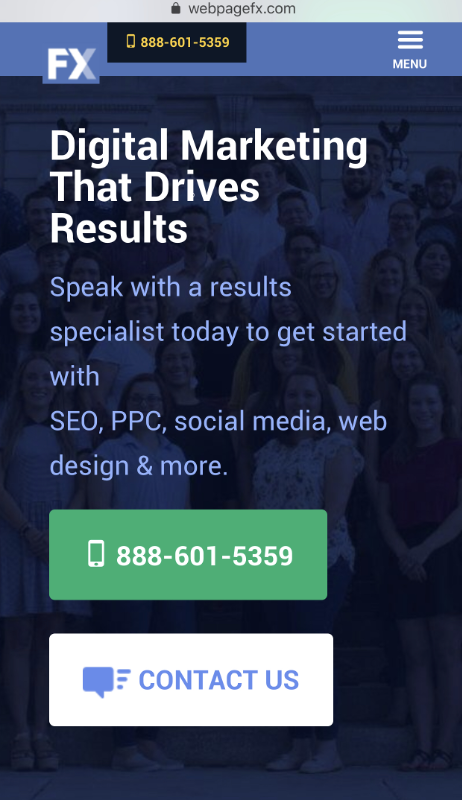
10. Speed Up the Loading Time
People’s attention span is getting shorter. Most of them aren’t willing to wait for a page that takes forever to load. A study by Google shows, for instance, that you could lose up to 20% in conversions with every second delay in your mobile page load. So make sure you optimize your mobile site by reducing file sizes, lazy loading, and other ways to speed up the loading process.
Where Would an App Work Best?
Nowadays, there’s an app for virtually everything. From scheduling to shopping, you can do anything on your mobile device with the help of an app. Below are the top use cases for mobile apps:
1. Banking Apps
If you provide banking or similar financial services, a mobile app would be a great choice. Compared to online banking on a website, banking apps provide better accessibility and security for their users. A bank’s mobile app allows users to enjoy multi-factor authentication and track their transactions in real-time through mobile alerts.
2. E-Commerce Apps
Results of a research done by Criteo show that e-commerce app conversion rates are three times higher than those on mobile websites. This is hardly surprising since e-commerce apps allow a more immersive shopping experience. Hence, shoppers not only spend a longer time in an app, they also spend twice as much than when they’re on a desktop or mobile website.
3. Music, Video, or Media Apps
Apps provide excellent control over the end-to-end experience. This makes them ideal for businesses that are content-driven such as those focused on music, video or media streaming. Take for instance, Spotify or YouTube. These companies maintain a website but their mobile users spend more time on their apps to stream content.
4. Gaming
For games, an app makes much more sense than a website. The gaming experience can be greatly improved via an app. The proof of this lies in the rise of gaming apps available over the last few years, and the fact people download these apps in staggering numbers.
5. News
Majority of users don’t have time to read through entire newspapers anymore. Apps allow users to have their news on the go with compressed formats that are instantly available.
6. Social Media
In times when people want speed in browsing, posting, liking or sharing something on social media, apps are an obvious choice.
7. Dating
Dating apps provide the best interactive and customizable features. It’s easier for users to upload pictures, get alerts, and update their profiles with it.
Conclusion
Wherever your main mobile traffic is coming from, it’s important to understand your target audience’s needs and your business goals. This will help you decide whether you need a mobile website, a mobile app, or even both.
If you want a simpler and easier way to provide mobile-friendly features to your audience, then a mobile website will suit you well. But if your goal is to engage and build customer loyalty through higher levels of personalization and security, going for a mobile app is an excellent move. You may also take the strategic choice of going for both if you’ve determined your users’ need for it.
Lastly, remember that all of your efforts at increasing mobile traffic to your site or app need to be accompanied by conversion rate optimization. You will only reap the fruits of your labor with a clever plan that includes maximizing for conversions.
